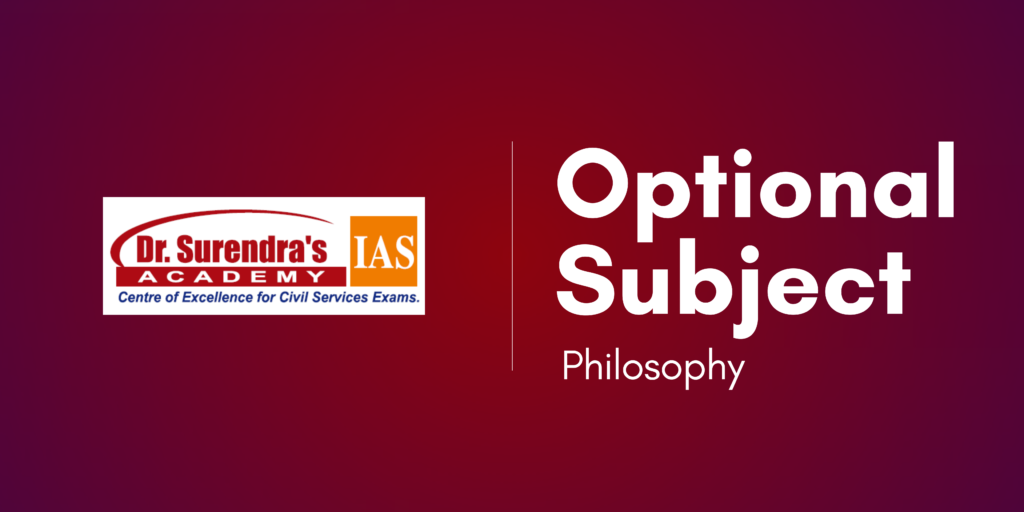
Date of Commencement
25th June 2024
Mode
CLASSROOM & LIVE-Online
Duration
16 Weeks
Fees
RS 54,000 incl. GST
About UPSC Philosophy Optional
Philosophy, which comes from the Greek words for “love” (philo) and “wisdom” (sophia), is essentially about having a deep appreciation for knowledge and understanding the world around us. It’s a subject that’s particularly suited for those who are naturally curious. Because philosophy forms the basis of many other academic fields, it’s often referred to as the “parent of all disciplines.”
When it comes to exams like the UPSC, the Philosophy syllabus is notably smaller compared to other optional subjects. But despite its size, it’s well-organized and straightforward. Paper I and Paper II are designed to complement each other, making it easier to grasp the full scope of the curriculum in a relatively short period.
Studying philosophy goes beyond just earning marks. It can actually be quite beneficial for papers like General Studies Paper IV: Ethics, Integrity & Aptitude, and the Essay Paper, where philosophical ideas are becoming increasingly relevant. Philosophy encourages critical thinking and helps individuals develop a deeper understanding of life, making them more perceptive, independent, and creative.
The topics covered in Paper II of Philosophy often overlap with those in the Essay Paper, touching on issues like democracy, justice, the environment, corruption, gender, religion, and caste. By studying philosophy, aspirants can gain valuable insights that will not only aid them in answering interview questions thoughtfully but also in becoming effective administrators in the future.
Is Philosophy a scoring subject in UPSC?
The choice of an optional subject holds considerable sway over the preparation process and eventual success in exams. Therefore, it’s crucial not to follow the crowd when selecting an optional subject. Instead, one should make a thoughtful and informed decision, choosing based on personal strengths and interests. As such, aspirants should act independently and choose their optional subject after careful reflection, rather than simply imitating others. In this context, Philosophy stands out as a noteworthy option, as it can offer various avenues for success.
Is Philosophy a good Optional Subject for UPSC?
Philosophy stands out as an extremely scoring optional subject for UPSC exams, with numerous students consistently securing top ranks by choosing it. From its inception, Philosophy has maintained its reputation as one of the highest-scoring subjects. Additionally, its unique nature allows students to excel not only in Philosophy but also in Ethics, Essay Writing, and the Personality Test.
To score well in Philosophy, it’s imperative for students to develop a deep understanding of the syllabus topics. Despite the limited time available to aspirants, Philosophy offers a distinct advantage with its concise syllabus, which remains static and doesn’t require frequent updates. This enables students to cover the entire syllabus thoroughly and efficiently.
Beyond acquiring knowledge, the key to scoring high lies in the ability to execute one’s understanding effectively. Answering questions with critical thinking, balanced judgment, logical consistency, and intellectual integrity is crucial. Philosophy not only enhances these skills but also improves students’ thinking, writing, and communication abilities, resulting in high marks across all Mains Papers and the Personality Test.
Moreover, Philosophy goes beyond exam success; it shapes aspirants into competent civil servants with a strong moral compass. It instills values of integrity and probity, guiding aspirants to serve society selflessly. Civil Services, viewed as a way of life, require a deep understanding of philosophical principles, as embodied in the Constitution of India. As students of Philosophy, aspirants become students of life, striving to uphold the ideals of service and contribute meaningfully to the well-being of society.
Benefits of selecting Philosophy as an optional subject for the UPSC exams
Choosing Philosophy as an optional subject for the UPSC exams offers several advantages:
Short and Precise Syllabus: The Philosophy optional syllabus is the shortest among all optional subjects. Additionally, it’s highly precise and doesn’t require frequent updates, making it easier to cover comprehensively in a short period.
No Prior Background Needed: Unlike some other subjects, no prior background in Philosophy is necessary to opt for it. Philosophy is often regarded as the parent of all disciplines, as it forms the basis for many academic subjects.
Enhances Thinking and Writing Skills: Contrary to the misconception that only good writers excel in Philosophy, studying the subject can significantly improve one’s critical thinking and writing abilities. Philosophy fosters a critical outlook, self-reliance, and originality in thinking and expression.
Benefits Extend Beyond Marks: The benefits of studying Philosophy extend beyond the marks allotted for the optional subject. Knowledge of Philosophy can be applied to other papers like CSAT, General Studies (Prelims and Mains), Ethics, Essay, and even the Personality Test.
Prepares for Ethics Paper: Since Ethics is a fundamental branch of Philosophy, students of Philosophy are better equipped to handle the challenges posed by the Ethics paper.
Relevant Themes for Essay Writing: Philosophical themes such as existence, democracy, justice, environment, corruption, gender, religion, and caste are common topics in the Essay paper. Studying Philosophy provides insights into these themes.
Provides Life Orientation: Philosophy, known as Darshan-shastra, offers a valuable perspective on life, enabling aspirants to answer interview questions more intelligently and insightfully.
High Success Rate: Philosophy optional consistently boasts a high success rate compared to other optional subjects, making it a popular choice among UPSC aspirants.
Syllabus of UPSC Philosophy Optional
Paper-I
Western Philosophy:
- Plato and Aristotle: Ideas, Substance, Causation.
- Rationalism (Descartes, Spinoza, Leibniz): Certain Knowledge, God, Determinism.
- Empiricism (Locke, Berkeley, Hume): Theory of Knowledge, Scepticism.
- Kant: Synthetic a priori Judgments, Categories, Critique of Proofs for God’s Existence.
- Hegel: Dialectical Method, Absolute Idealism.
- Moore, Russell, Early & Later Wittgenstein: Commonsense, Idealism, Logical Atomism, Language-games.
- Logical Positivism: Verification Theory, Rejection of Metaphysics.
- Quine: Critique of Empiricism.
Indian Philosophy:
- Cārvāka: Theory of Knowledge, Rejection of Transcendent Entities.
- Jainism: Theory of Reality, Bondage, Liberation.
- Schools of Buddhism: Dependent Origination, Momentariness, Non-self.
- Nyāya-Vaiśeṣika: Categories, Theory of Causation, Proofs for God’s Existence.
- Sāṁkhya: Prakṛti, Puruṣa, Liberation.
- Yoga: Mental modifications, Afflictions, Liberation.
- Mimāṁsā: Theory of Knowledge.
- Schools of Vedānta: Brahman, Self, World, Māyā, Liberation.
- Aurobindo: Evolution, Integral Yoga.
Paper-II
Socio-Political Philosophy:
- Social and Political Ideals: Equality, Justice, Liberty.
- Sovereignty: Concepts by Austin, Bodin, Laski, Kautilya.
- Individual and State: Rights, Duties, Accountability.
- Forms of Government: Monarchy, Theocracy, Democracy.
- Political Ideologies: Anarchism, Marxism, Socialism.
- Humanism, Secularism, Multiculturalism.
- Crime and Punishment: Corruption, Violence, Capital Punishment.
- Development and Social Progress.
- Gender Discrimination: Female Foeticide, Empowerment.
- Caste Discrimination: Views of Gandhi and Ambedkar.
Philosophy of Religion:
- Notions of God: Attributes, Relations to Man and World.
- Proofs for the Existence of God and Critique.
- Problem of Evil.
- Soul: Immortality, Rebirth, Liberation.
- Reason, Revelation, Faith.
- Religious Experience: Nature, Object.
- Religion without God.
- Religion and Morality.
- Religious Pluralism, Absolute Truth.
- Nature of Religious Language: Analogical, Symbolic, Cognitivist, Non-cognitive.
